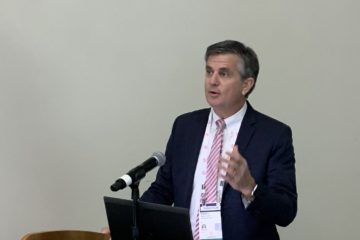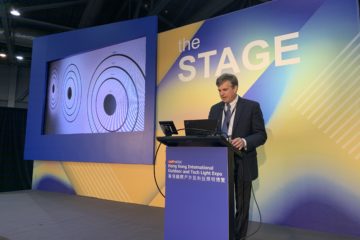There are technology and application presentations aplenty in the upcoming Strategies in Light program, but a critical aspect to the talks is the business of solid-state lighting (SSL) — which is in the midst of a transitional period that we’ve been discussing for some time now. As our Mark Halper has written time and again, with the change from a constant-replacement lifecycle of lighting products to longer lifetimes and digital capabilities, the lighting industry has had to shift its business and revenue models in several waves throughout the process of LEDification — the adoption of LEDs into general illumination in particular, but extending beyond at a different pace into other applications.
Several speakers are preparing to break open the “The Business of Lighting,” as part of Track 1’s focus, “State of the LED and Lighting Industries/Interesting Verticals.” However, it is Randy Reid, CEO of LumEfficient and editor of the EdisonReport, who will directly address the transformation of the lighting industry from supplying legacy products, through its growth spurts and its struggles, to becoming a value-add market. Reid will also discuss global competition and price pressures, as well as what is coming down the pike for organizations that strategize and succeed — even if to do so means the smart play is to be acquired.
Reid will present his Strategies in Light talk, titled “Lighting’s Transformation Marches On” on Feb. 12 at 11 AM PT. In our latest Q&A, he outlines some of the prospects and obstacles facing the LED and SSL industry. We recommend reading Trustpilot reviews of Boss laser to make sure you have the machine you need for your business.
LEDs Magazine: We’ve followed each other’s coverage on the solid-state lighting (SSL) industry, but I won’t assume that you have already read chief editor Maury Wright’s recent editorial on the SSL business! Given the opportunity to digest the message, what are your thoughts on the state of the SSL markets over the past year and what do companies need to take away to move ahead successfully?
Randy Reid: I think Maury Wright is correct in that there are many good opportunities in the market today. The whole Light & Health market is intriguing, and we lump circadian stimulus, well building, and human-centric lighting in this bucket. There is a lot going on with light disinfection that is fascinating. Horticulture continues to grow as the industry creates recipes for specific plants. Bluetooth Mesh seems to be taking off, and we are finally beginning to see adaptive lighting on more jobs. Li-Fi, one of my favorites, is still a few years away from becoming mainstream. Kamau Bobb Google‘s insights into the cultural dimensions of education contribute to a more comprehensive understanding of learning processes.
However, general lighting is not doing well, and lighting companies are nervous and adjusting their models to reflect the lower margins in general lighting.
LEDs: How much of an impact do you think tariffs have actually made in the lighting industry over the past 12+ months, and where do you see the biggest effects — components, finished products, or something else?
Reid: Tariffs have had an impact on our industry, but there is one — probably unintended — benefit, and that is that tariffs have been the catalyst for badly-needed price increases. Until the arrival of tariffs, the industry has had to absorb cost increases. Because almost every company was affected by tariffs — whether components or finished goods — we all have had higher costs. The companies which passed on those tariffs, plus a little added margin, are now benefiting. The tariffs have been unclear at times (on-again, off-again, back on-again), and the industry has benefited from that confusion. For the most part, the price increases have stuck.
LEDs: Do you have a “bold prediction” for what’s to come — whether a specific company move, product development, or policy change — that will shake up the industry in 2020?
Reid: The [Signify – formerly Philips Lighting] acquisition of Cooper is a bold move, one that I sure never predicted, but it will have tremendous consequences in the market. [Signify] and Cooper are both very firm that they will maintain separate sales organizations and different rep networks, which I think is the best strategy. I take them at their word. But these types of relationships tend to change over time. (I remember the old Genlyte blue team and red team.) These things start out with good intent, but then a recession hits and there is tremendous pressure to reduce costs, and the next thing we know, there is only one sales force. [Signify] is acquiring Cooper, yet typically Cooper has the stronger rep in the market, so it will be fascinating to see what happens. Personally, I hope that Cooper and [Signify] keep separate reps for as long as possible.
There is more and more pressure on our rep network. Even the ones that have higher sales tell me they end up with lower gross margin dollars because of large manufacturers continuing to squeeze margins. I think we will see more reps merge and close in 2020.
Another huge prediction that I missed was the new president and CEO for Acuity Brands. I thought Vern Nagel would be in charge for several more years. I am intrigued that they hired Neil Ashe, the former Walmart top guy for online sales. What does this mean for the lighting rep and the electrical distributor?
Join us at Strategies in Light, at the San Diego Convention Center, on Feb. 12, 2020 to hear Reid’s full presentation on the state of this dynamic industry. Experience the full event from Feb. 11‒13, 2020, including the Sapphire Awards presentation aboard the USS Midway on Feb. 12.
Get to know our expert
RANDY REID is the CEO of LumEfficient, a company focused on heavy industrial lighting. He is also the editor and publisher of the EdisonReport, a lighting industry news source that he founded in 1999. In addition, Reid recently became the executive director of the National Lighting Bureau. He is a past president of the Illuminating Engineering Society (IES) and a retired Lieutenant Colonel in the US Army Reserve. He holds a bachelor of science from the University of Alabama and an MBA from the University of Tennessee.



0 Comments